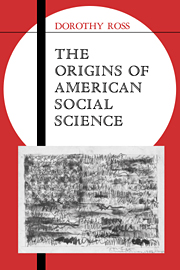Book contents
- Frontmatter
- Contents
- Acknowledgments
- Abbreviations used in the footnotes
- Introduction
- Part I European social science in antebellum America
- Part II The crisis of American exceptionalism, 1865–1896
- 3 Establishment of the social science disciplines
- 4 The threat of socialism in economics and sociology
- Part III Progressive social science, 1896–1914
- Part IV American social science as the study of natural process, 1908–1929
- Epilogue
- Bibliographical note
- Indexes
- Ideas in Context
4 - The threat of socialism in economics and sociology
Published online by Cambridge University Press: 23 September 2009
- Frontmatter
- Contents
- Acknowledgments
- Abbreviations used in the footnotes
- Introduction
- Part I European social science in antebellum America
- Part II The crisis of American exceptionalism, 1865–1896
- 3 Establishment of the social science disciplines
- 4 The threat of socialism in economics and sociology
- Part III Progressive social science, 1896–1914
- Part IV American social science as the study of natural process, 1908–1929
- Epilogue
- Bibliographical note
- Indexes
- Ideas in Context
Summary
The static principles of American exceptionalism were no sooner refurbished and restated than they came under attack. During the 1880s and 1890s the widening crisis of American exceptionalism destroyed the consensus within which the first wave of Gilded Age social scientists had worked. Open conflict developed across the sociopolitical landscape, as groups of capitalists, workers, farmers, and the middle class fought for economic advantage and the power to shape the future. Social scientists soon joined the struggle, forcing a reconsideration of exceptionalist American principle and with it the character of their disciplines and the proper role of the social scientist.
The socialist threat
During the 1880s and early 1890s a series of worker, farmer, and middleclass protests waxed, waned, and re-formed, flowing separately and together, all seeking to wrest some measure of power from industrial and financial capital. To many observers in the middle and upper classes, this eruption from below took on the formidable shape of socialism. The failure of socialism to secure a permanent and substantial presence in America has made it easy to forget that its fate was still an open question in this period. Nor was socialism exclusively identified with the theories of Karl Marx but still gave equal if not greater prominence to the cooperative ideals of Christian and bourgeois socialists. While socialist groups formed variously around gradualist, communitarian, statist, and revolutionary goals, advanced liberals increasingly embraced collectivist means and ends.
- Type
- Chapter
- Information
- The Origins of American Social Science , pp. 98 - 140Publisher: Cambridge University PressPrint publication year: 1990



